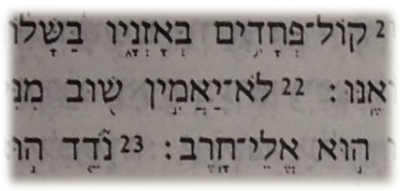While working on the Mechanical Translation, I was working on Leviticus 14:21 and the Hebrew word דל (dal), which means one who is poor, sick or weak. The investigation into this word provides an example of the process that I go through when translating and defining Hebrew words for this translation.
Years ago, when working on the Ancient Hebrew Lexicon of the Bible I identified the Hebrew word דל (dal) as a parent (two-letter) root word. I found that all of the words derived from this parent root had the common theme of something "dangling." The word דלת (delet) is a "door" that dangles down from the tent roof. The verb דלל (D.L.L) means "to hang down" and the verb דלה (D.L.H) means "to draw water" as with a bucket that dangles on a rope. Derived from the verb דלה (D.L.H) are the words דליה (dal-yah), meaning a branch, which hangs in the tree, and דלי (deliy), a bucket, which hangs down in the well. From this I concluded that the word דל (dal) meant one who is poor, sick or weak in the sense of one who "dangles" his head down in weakness or shame.
Another word closely related to דל (dal) is דלה (dal-lah), a feminine noun with the same meaning as דל (dal). In the Masoretic Hebrew text and Hebrew dictionaries this feminine noun is written as דַּלָּה (dal-lah). The dots and dashes, called the nikkudot, represent vowels and other characteristics of Hebrew pronunciation. The dot in the center of the lamed (ל) is a dagesh which doubles the Hebrew letter, so this word could be written as דללה (d-l-l-h). If this were true, then this noun would have been derived out of the verb דלל (D.L.L), meaning "to hang down." However, the original Hebrew text did not include the dagesh or the other nikkudot, as they were created about 1000 years ago. So I surmised that the word דַּלָּה (dal-lah) was in fact the word דלה (da-lah) without the dagesh, and was simply the feminine form of דל (dal). I should note that feminine nouns are commonly formed by adding the letter ה (h) to a masculine noun.
In the Ancient Hebrew Lexicon of the Bible I assigned the number 1081-A (Nm) to the masculine word דל (dal) and translated this word as "weak" and defined it as "one who dangles the head in poverty or hunger." I then assigned the number 1081-A (Nf1) to the feminine word דלה (dal-lah) and translated it as "poor" and defined it as "one who hangs the head low in weakness."
However, there was one problem. The Hebrew word דלה (dal-lah) was used in Song of Solomon 7:5 for "hair," which has no relationship with being sick, poor or weak. So I included two different translations for the word דלה (dal-lah), the first being "poor" and the second being "hair," which I defined as "what hangs from the head and is easily blown by the wind."
The Ancient Hebrew Lexicon of the Bible was completed and published in 2005. A few years later I began working on the Mechanical Translation, using the Ancient Hebrew Lexicon of the Bible as the foundation for the translation. As I work on this translation I am working to better define Hebrew words. I took another look at the Hebrew word דל (dal), which appears in Leviticus 14:21. I determined that since the words דל (dal) and דלה (da-lah) have the same meaning, but one being a masculine word and the other feminine, I chose to combine these two words into one entry. I also decided to change the translation of this word, from "weak" and "poor," to "helpless," which is a better descriptive translation of this word.
Mechanical Translation of the Torah entry for
דל and דלה
דל dal (m.) דלה da-lah (f.) Trans: HELPLESS Def: Unable to care or provide for one's self; one who is weak, sick or poor. Rel to root: The helpless dangle their head down in illness or poverty. Occurences: 6 Strong's: 1800
|
But I was still left with the problem of Song of Solomon 7:5 where this word is translated as "hair." It then occurred to me that while I had previously determined that the word דַּלָּה (dal-lah, with the dagesh) was actually the word דלה (da-lah, without the dagesh), it was quite possible that the word in Song of Solomon 7:5 was in fact the word דללה (dal-lah, with the dagesh) and was derived from the verb דלל (D.L.L), meaning "to hang down." This worked well as "hair" is what "hangs down" from the head.
Strong's Dictionary has assigned the number 1803 to the word דַּלָּה (dal-lah), which I have determined to be the words דלה (da-lah) and דללה (dal-lah), and identifies it as being derived from the verb דלה (D.L.H) meaning "to draw water with a dangling bucket." But the Brown-Driver-Briggs Lexicon identifies the root of דַּלָּה (dal-lah) as being derived from the verb דלל (D.L.L), meaning "to hang down." Strong's and Brown-Driver-Briggs agree that the word in question is דַּלָּה (dal-lah), but they disagree on the root of the word. While I do not claim to be smarter than any of these Hebraists, I do believe their work can be improved upon, such as I have done with the word דַּלָּה (dal-lah).






 (דל DL) — Weak: One who dangles the head in poverty or hunger. [freq. 48] |kjv: poor, needy, weak, lean| {str: 1800}
(דל DL) — Weak: One who dangles the head in poverty or hunger. [freq. 48] |kjv: poor, needy, weak, lean| {str: 1800} 
